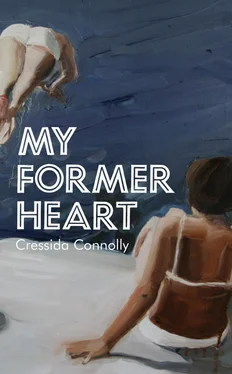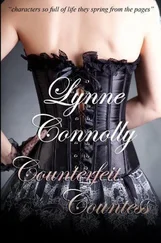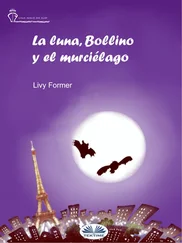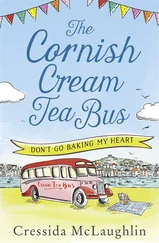Ruth didn’t know if the cinema manager ever sent the photograph. She never saw it if he did. But she believed that Iris had made her mind up that afternoon at the cinema, when they were both, for their different reasons, crying in the flickering dark. Because three days later, Iris took her daughter to Paddington station and put her on the train. And then, even before the guard had walked the length of the platform to close all the doors, before the flag was waved or the whistle went, she was gone.
Ruth liked her grandparents’ house in Malvern, except that she missed her mother and she did not like the cold, or the henhouse. She loved her grandparents, both of them; their soft voices and their routine and quiet kindness. In the evenings, before supper, her grandfather sometimes read to her, adventures by Rider Haggard and Erskine Childers, or stories by Kipling. Ruth was mousier, less emphatic, than her mother, with a sturdier frame; she felt at home with her grandparents. Even so, there were occasions when the cold was so cold as to be indistinguishable from misery: sometimes, when she cried at night, even she could not have said whether it was from missing her mother or because she could not get warm. London had been cold too, but the rooms were smaller and her mother had taken to lighting a coal fire downstairs in the kitchen grate and staying in there, where it could be made warm, even if it was not so comfortable as the first-floor sitting room.
The house at Malvern had high-ceilinged rooms with big Victorian sash windows, to make the most of the view. Before the war there had been log fires in every grate, but now there was only a one-bar electric fire in the drawing room, which would be unplugged and brought to stand in the grate of the breakfast room before they ate. But it was only ever switched on just before they came in to sit down, more a formality than an actual heating appliance. And there was never enough hot water to get really warm in the bath. Ruth developed chilblains, which made her toes tickle, then throb and burn. Until Mrs Jenkins, who came in to clean every morning, took the potty Ruth used at night and – horrifyingly – dipped a linen hand towel into the urine and dabbed Ruth’s toes with it, bringing an exquisite but temporary relief, like a dock leaf on a nettle sting.
The house, like the town of which it formed a part, stood in the lee of a western slope. Even as a child Ruth was aware of the way that the whole place fell into shadow, as the sun slipped behind the hulk of the hills. But she liked the way you could still see a wide band of sunlight, sliding perceptibly across the lawn like the train of a wedding dress, away from her grandparents’ house towards the distant abbey towns, with their wide rivers and gentle slopes of ancient orchards. She imagined the sun was still shining in London, long after Malvern had fallen into shade.
Her grandparents were her father’s parents, although it was her mother who had sent her to stay with them. Iris’s mother was alive, but she lived outside Sidmouth, a long way away, and her house was thought to be unsuitable for children; no one ever explained why. Ruth hardly ever saw this grandmother, who had been a widow for years and smelled of tobacco and face powder – dry smells, musty, like the bottom of an old handbag. But she had often stayed with her Malvern grandparents before. She and Iris had spent several weeks there together, towards the end of 1940, during the worst of the Blitz. In the winter the mottled colours of rock, dead bracken and gorse made the hills look like giant slabs of Christmas cake. Iris had played cards with her father-in-law after dinner each evening, while his wife added pieces to the jigsaw which was accumulating slowly on the writing table in the window.
Ruth had shared a room with her mother during that visit. Before bed, Iris always pinned her hair into tight coils with kirby grips, so that it would curl the next day. While she sat doing her hair she would talk to her daughter in a loud whisper; so loud, it seemed to Ruth, that it would have been better – quieter – if she had spoken in her normal voice.
‘Why does your grandmother have to do those enormous puzzles?’ she asked one evening. Ruth could tell it wasn’t really a question.
‘I don’t know. Why shouldn’t she?’
‘Well, darling, because they take so long. I mean, an eternity.’
‘She likes it, I s’pose. She likes it that they take ages.’
‘Well, obviously. But if one’s going to do jigsaws at all, at least do them of places further away. Why spend weeks at a time doing a yard-long picture of Bourton-on-the-Water, or the swans on the river at Stratford? Why not just go and see the real thing?’
‘It’s not to do with the places. It’s to do with finding the pieces,’ said Ruth.
‘Exactly,’ said Iris, dragging out the second syllable as if it were a cigarette she was drawing on. ‘It’s just that one might think they’d have had enough of the wretched damp countryside, looking at it from practically every window. One would think she’d want to do a puzzle of somewhere a bit more dashing. Monte Carlo. Or the Alps even.’
Ruth thought for a moment. ‘I don’t believe Granny wants to be dashing,’ she said.
‘Well,’ said Iris, ‘yes.’
Ruth’s uncle Christopher had come back to live with her grandparents for the duration. He was teaching science at the Malvern Boys College. Or at least he said he was, and it was true that he was a teacher. It was only years later that Ruth learned that he’d actually been involved in developing signals and radar, based at the evacuated school. He hadn’t been able to enlist because of his poor eyesight, although he was better at seeing things than anyone his niece knew: he could spot a buzzard from miles away, and tell it from a hawk. He knew the names of all the birds and wild flowers. Ruth liked birds, except for chickens. Soon after she arrived, Christopher began to take her for long walks on the hills at weekends. With her stumpy legs and her thick springy hair, she reminded him of a valiant little pony. He knew the secret places where you could drink the icy spring water straight from the rock, so clear that it tasted more like air – exhilarating, like sea air – than water. Christopher was an expert whistler, could whistle any tune, however elaborate. For some reason which Ruth did not understand this annoyed his mother.
It was not yet spring when Ruth arrived at Malvern. That first night she pulled her bed away from the wall and wrote ‘mummy and daddy’ in her neatest writing on the wallpaper, below the line of the mattress, where no one would be able to see it. It was intended as a sort of spell, to make them come back.
Gradually, over the weeks, the cold began to give way to thin sunlight. The early wallflowers in her grandparents’ garden smelled of watery marzipan then, as if the summer to come was hidden inside them. There was a tall monkey puzzle tree outside her bedroom window, and Ruth used to wish that she could find a real-life monkey and open her window and put it out on a branch, to see how puzzled it would be, or whether it would be able to climb down. When she ran her hands along one of the branches, little barbs at the end of each leaf stabbed at her fingers.
Neither of her grandparents asked questions about her mother. They didn’t really ask questions about anything much: they didn’t interfere. They weren’t strict, except about manners, table manners in particular. The table was always laid properly. Everyone had their own big white napkin, rolled up inside a silver ring; and there were special little spoons made of mother-of-pearl for the salt; and spoons made of horn, with long handles, for boiled eggs. There were fruit knives with coloured glass handles, like polished beads, and in summer there were crescent-shaped salad plates. There were two pheasants made of silver as a centrepiece; or, as the weather improved, stiff flowers in a cut-glass bowl which had a mesh made of wire, like a stiffened hairnet, to keep them in place. In London, when it was just her and Ruth, Iris had got into the habit of doing without side plates, or napkins, or butter knives: she couldn’t see much point, since there wasn’t enough butter in the first place. She even put the jam on the table in the jar it came from the shop in, though not if there were visitors.
Читать дальше












